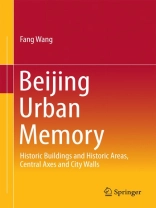From the cross-disciplinary perspective of urban management and planning, geography and architecture, this book explores the theory and methods of urban memory, selecting Beijing’s historic buildings, historic areas, central areas and city walls as research cases. It is divided into three parts: factors analysis, modeling and practical application. It lays a scientific foundation and provides practical methods for the management of historical spaces, residents’ and commercial activities, optimizing the layout and structure of the historic spaces, updating the protection of old buildings, promoting the organic growth of historic sites and the sustainable development of urbanization with new concepts.
قائمة المحتويات
1 About the Development of Urban Memory.- 2 Point: Historic Buildings in Beijing’s Measurement of Urban Memory.- 3 Line: Central Axis of Beijing’s Measurement of Urban Memory.- 4 Line: City Wall of Beijing’s Measurement of Urban Memory.- 5 Place: Historic Sites of Beijing’s Measurement of Urban Memory.- 6 Conclusion and Discussion.- References.
عن المؤلف
Dr. Fang Wang(1973-) is Associate Professor in College of Architecture and Landscape Architecture, Peking University and a registered urban planner. After receiving a Ph.D. in Architectural Design and Theory from Tsinghua University, Dr. WANG completed her postdoctoral research in geography with a concentration in urban planning at Peking University. From 2011 to 2012 Dr. WANG was a visiting scholar at Harvard University Graduate School of Design. She is a member of the Chinese Academy of City Planning, Chinese Geographical Society, and Chinese Architectural Society. Her research fields are urban planning and management, especially focusing on the protection, renewal and sustainable development of cultural landscape and historical districts. Dr. WANG has published over 70 articles and 2 books and has translated a total of 8 English academic books. She has piloted one China Natural Science Foundation project (No.51078003), two Sino-German Center projects (No.GZ1156, GZ1201) and sixother projects of provincial and ministry-level funding. She also led her team to win the Second Prize of Land Resources Science and Technology Award in 2015 sponsored by Ministry of Land and Resources, the Third Prize of Excellent Tourism Academic Achievements in 2011 sponsored by National Tourism Administration. It is worth mentioning that Ms. WANG has signed with Springer for publishing two (series) books, one is Urbanization and Locality: Strengthening Identity and Sustainability by Site-specific Planning and Design (by WANG Fang, Martin Prominski) which has been published, another is Geo-architecture Landscape in China’s Geographic and Historic Context Series (by WANG Fang) which has been submitted in September, 2015.












